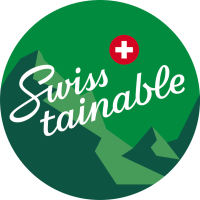Intro
Our nature is our greatest asset. That’s why we protect it. With its mighty mountains, turquoise-blue lakes and enchanted forests, Switzerland is a unique travel destination. Our nature provides energy – and it has to stay that way. For us, and for all generations to come.
A new approach to travel
Sustainable travel doesn’t necessarily mean having to go without. Sustainable travel means greater awareness and depth and more enjoyment. With this in mind, Switzerland follows its own sustainability strategy: Swisstainable.
Swisstainable is all about having one’s finger on the pulse – and maximum relaxation in a natural setting:
- Enjoy nature up close and at first hand
- Experience the local culture in an authentic way
- Consume regional products
- Stay for longer and delve deeper
Switzerland as a sustainable travel destination
-
Mobility
More than 11,000 trains travel daily on SBB's network, which is around 3,000 km long and carries more than 1.1 million passengers per day. With one of the densest rail networks in the world, even the most remote places are accessible by public transport.
-
Water
Switzerland holds about 6% of the continent's fresh water reserves and is considered the water castle of Europe. Many large rivers such as the Rhone, Rhine, Ticino and Inn have their source here. It is unique in that even in the larger cities it is possible to bathe without hesitation.
-
Nature conservation
A total of 20 Swiss parks cover one seventh of the country's surface area (5,839 km2). Furthermore, since 1876, the Forest Act has ensured that the area of Swiss forests does not decrease. Today, 31% of Switzerland is forested – and the trend is rising.
-
Air
We have always been known as an air and climate health resort with therapeutic effects and already in 1853 the health-promoting climate of the Davos mountain air was discovered. Today, we are in a good position with regard to air quality. For example, Switzerland is one of the countries in Europe with the lowest concentrations of particulate matter.
-
Food
Compared to our international counterparts, we consume the most organic products per capita. And Swiss retailers have been leading the international sustainability rankings for years.
-
Recycling
Switzerland is one of the world’s leading countries when it comes to recycling and waste management, with almost 85% of PET bottles being put to new use.
-
Overnight stays
More and more accommodation options in Switzerland have chosen the path of sustainability. To minimise their ecological footprint, they focus a great deal of attention on energy efficiency or the availability of organic food.
-
Society
Switzerland thematises, cultivates and promotes regional culture. It also fosters dialogue between guests and the local population. It addresses special guest needs such as accessibility. The country encourages its guests to behave in a considerate manner.

